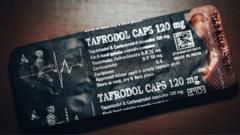Authorities have shut down operations of a pharmaceutical company linked to the crisis, seizing its entire stock.
India Moves to Combat Opioid Crisis in West Africa with Drug Ban

India Moves to Combat Opioid Crisis in West Africa with Drug Ban
India's response follows a BBC investigation exposing the illegal export of addictive opioids to West Africa.
India has taken decisive action against two highly addictive opioids after a BBC investigation revealed their role in a burgeoning public health emergency in West Africa. The Drug Controller General of India, Dr. Rajeev Singh Raghuvanshi, announced that manufacturing and export permissions for the harmful drug combination of tapentadol and carisoprodol have been revoked. This decision follows a comprehensive report that identified the Mumbai-based pharmaceutical company Aveo as a key player in the illegal export of these opioids to several West African nations, including Ghana, Nigeria, and Côte d'Ivoire.
The investigation, carried out by BBC Eye, uncovered troubling practices at Aveo, which was found to have shipped millions of opioid tablets to the region. In a swift response, India's Food and Drug Administration (FDA) confirmed that they had raided Aveo's Mumbai factory and seized its entire stock. The circular issued by Dr. Raghuvanshi elucidated that the ban on the drug combinations would take effect immediately, citing both the investigation's findings and concerns over the potential for abuse and the detrimental impact on public health.
Tapentadol, known for its powerful pain-relieving properties, is classified as an opioid, while carisoprodol, a muscle relaxant notorious for its addictive potential, is already banned in Europe. Although carisoprodol is permitted in the U.S. for short-term use, its misuse poses serious health risks, including withdrawal symptoms such as anxiety and hallucinations. The combination of these drugs is particularly dangerous, as it can lead to life-threatening respiratory issues and seizures, yet their cheap price and availability have made them popular among street drug users in West Africa.
Investigative reporting revealed that packets featuring Aveo's branding were accessible on the streets of Nigeria, where around four million people reportedly suffer from opioid addiction, according to the National Bureau of Statistics. To gather evidence, the BBC conducted an undercover operation, gaining access to one of Aveo's facilities. In startling footage, a director of the company, Vinod Sharma, openly acknowledged the harmful nature of the drugs they produced, while discussing their appeal among teenage users in Nigeria.
In light of this investigation, India's FDA has promised to intensify its oversight of pharmaceutical practices, stating that further legal measures against Aveo will follow. They have expressed their commitment to eradicating illegal activities within the drug trade that compromise the country's reputation and threaten public health. With the ban now instituted, India aims to rectify the situation and mitigate the impact of these deadly opioids in West Africa.
The investigation, carried out by BBC Eye, uncovered troubling practices at Aveo, which was found to have shipped millions of opioid tablets to the region. In a swift response, India's Food and Drug Administration (FDA) confirmed that they had raided Aveo's Mumbai factory and seized its entire stock. The circular issued by Dr. Raghuvanshi elucidated that the ban on the drug combinations would take effect immediately, citing both the investigation's findings and concerns over the potential for abuse and the detrimental impact on public health.
Tapentadol, known for its powerful pain-relieving properties, is classified as an opioid, while carisoprodol, a muscle relaxant notorious for its addictive potential, is already banned in Europe. Although carisoprodol is permitted in the U.S. for short-term use, its misuse poses serious health risks, including withdrawal symptoms such as anxiety and hallucinations. The combination of these drugs is particularly dangerous, as it can lead to life-threatening respiratory issues and seizures, yet their cheap price and availability have made them popular among street drug users in West Africa.
Investigative reporting revealed that packets featuring Aveo's branding were accessible on the streets of Nigeria, where around four million people reportedly suffer from opioid addiction, according to the National Bureau of Statistics. To gather evidence, the BBC conducted an undercover operation, gaining access to one of Aveo's facilities. In startling footage, a director of the company, Vinod Sharma, openly acknowledged the harmful nature of the drugs they produced, while discussing their appeal among teenage users in Nigeria.
In light of this investigation, India's FDA has promised to intensify its oversight of pharmaceutical practices, stating that further legal measures against Aveo will follow. They have expressed their commitment to eradicating illegal activities within the drug trade that compromise the country's reputation and threaten public health. With the ban now instituted, India aims to rectify the situation and mitigate the impact of these deadly opioids in West Africa.






















